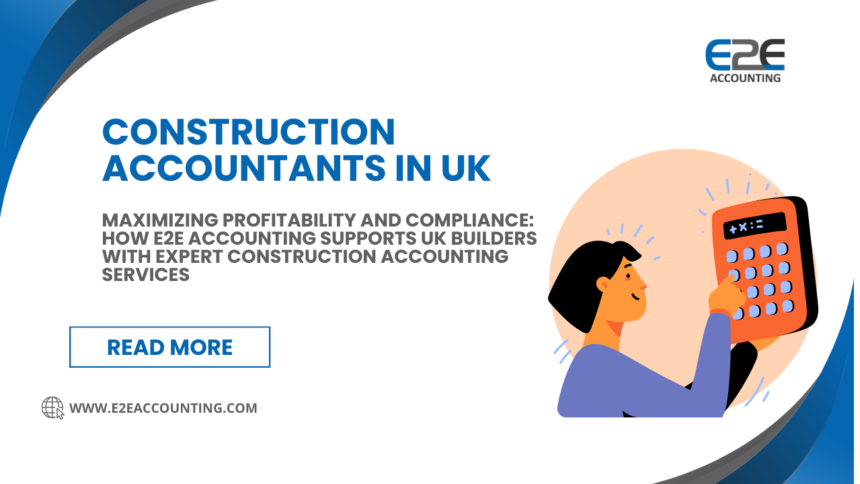The construction industry is one of the most dynamic sectors in the UK economy, encompassing businesses of all sizes, from small contractors to multinational firms. Amidst the industry’s complexities—compliance with regulations, fluctuating costs, and intricate project management—construction accountants emerge as indispensable partners for businesses striving to maintain profitability and sustainability.
This blog explores the pivotal role of construction accountants, the challenges they help overcome, and how they contribute to streamlining financial operations for construction businesses.
What Are Construction Accountants?
Construction accountants are professionals who specialize in managing the financial aspects of construction businesses. Their expertise extends beyond standard accounting practices to include industry-specific knowledge. They understand the unique challenges construction firms face, such as project-based accounting, retention accounting, and compliance with Construction Industry Scheme (CIS) regulations.
Their services typically include:
- Project Cost Management
- Tax Compliance and Planning
- Payroll Management for Subcontractors
- Financial Forecasting and Budgeting
- Handling Construction Industry Scheme (CIS) Deductions
Unique Challenges in Construction Accounting
The construction industry presents a unique set of challenges, making standard accounting approaches insufficient. Here are some key obstacles that construction accountants help address:
- Project-Based Accounting
Unlike other industries, construction companies operate on a project basis, with each project requiring individual financial tracking. Accurate cost allocation for labor, materials, and overheads is critical. - CIS Compliance
The Construction Industry Scheme (CIS) mandates contractors to deduct tax at source from payments made to subcontractors. Ensuring compliance while minimizing errors is a constant challenge. - Fluctuating Costs
Material costs and labor expenses can vary significantly due to market conditions. Construction accountants help businesses navigate these fluctuations by providing accurate cost predictions. - Retention Accounting
Contractors often retain a percentage of payments to subcontractors until project completion. Managing these retention sums requires meticulous financial tracking. - Complex Payroll Systems
With a mix of permanent staff and subcontractors, construction businesses often grapple with complex payroll systems. Ensuring timely and accurate payments is vital to maintaining workforce satisfaction.
Key Responsibilities of Construction Accountants
Construction accountants serve as the backbone of financial operations for construction businesses. Their responsibilities include:
1. Project Cost Management
Construction projects demand robust cost control to prevent budget overruns. Accountants track project expenses, ensuring resources are allocated efficiently. This includes labor, materials, equipment, and overheads.
2. Cash Flow Management
Construction businesses often face cash flow issues due to delayed payments or project-specific constraints. Accountants help in preparing cash flow forecasts, ensuring that companies can meet operational expenses and avoid disruptions.
3. Taxation and CIS Compliance
Navigating the complexities of CIS and VAT in the construction sector requires specialized knowledge. Accountants ensure accurate tax filings, timely submissions, and optimized tax planning to reduce liabilities.
4. Payroll Processing
Managing payments to employees and subcontractors is a significant task in construction accounting. Accountants ensure payroll accuracy, compliance with employment laws, and proper deductions for CIS where applicable.
5. Financial Reporting
Construction accountants prepare detailed financial reports, including profit and loss statements, balance sheets, and project-specific reports. These reports provide business owners with valuable insights to make informed decisions.
Benefits of Hiring a Construction Accountant
Hiring a construction accountant is a strategic decision that brings numerous benefits to construction businesses:
- Expertise in Industry-Specific Accounting
Construction accountants possess deep industry knowledge, ensuring compliance with regulations like CIS and providing solutions tailored to the construction sector’s needs. - Improved Financial Accuracy
With professional oversight, businesses can avoid errors in financial reporting, tax filings, and payroll processing. - Cost Efficiency
Construction accountants identify areas where costs can be reduced without compromising quality, helping businesses maximize profitability. - Time Savings
By outsourcing financial management, business owners can focus on core activities like project management and client acquisition. - Enhanced Decision-Making
With access to accurate financial data and insights, construction businesses can make well-informed strategic decisions.
How Construction Accountants Add Value to SMEs
Small and medium-sized enterprises (SMEs) in the construction industry often operate with limited resources. For these businesses, hiring a construction accountant is not just a luxury but a necessity.
- Scalability
Construction accountants help SMEs scale operations by providing financial strategies that align with growth objectives. - Risk Management
Accountants identify potential financial risks, such as delayed payments or compliance issues, and develop mitigation strategies. - Support in Bidding and Estimation
Accurate financial projections are critical when bidding for contracts. Construction accountants assist in creating competitive yet profitable bids.
Technology and Construction Accounting
The integration of technology into construction accounting has revolutionized how financial operations are managed. Cloud-based accounting software like Xero, QuickBooks, and Sage enables real-time tracking of expenses and revenues.
Key Features of Technology in Construction Accounting:
- Real-Time Collaboration: Teams can access financial data anytime, anywhere.
- Automated CIS Compliance: Simplifies tax deductions and filings.
- Data Analytics: Provides insights into project performance and profitability.
- Mobile Accessibility: On-site teams can input expenses directly into the system.
Construction accountants leverage these tools to streamline processes, reduce errors, and enhance efficiency.
Choosing the Right Construction Accountant
Selecting the right construction accountant is crucial for ensuring financial stability and compliance. Here are some factors to consider:
- Experience in Construction Accounting
Verify that the accountant has substantial experience handling construction businesses. - Knowledge of CIS and VAT
Ensure they are well-versed in industry-specific regulations like CIS and VAT. - Technological Proficiency
An accountant familiar with modern accounting software and tools can bring added efficiency. - References and Testimonials
Seek feedback from other construction businesses to gauge their satisfaction with the accountant’s services.
Conclusion
Construction accountants play an integral role in the success of construction businesses in the UK. Their expertise in managing project-based finances, navigating CIS regulations, and providing actionable financial insights enables construction firms to thrive in a competitive market.
Whether you are a small contractor or a large construction company, partnering with a skilled construction accountant can be the difference between financial chaos and long-term stability. By entrusting your financial operations to experts, you not only ensure compliance but also unlock the potential for growth and profitability in an industry known for its challenges.
Investing in construction accounting is not just a cost—it’s a strategic move that empowers businesses to build a strong foundation for success. If you’re looking to enhance your financial operations and take your construction business to the next level, now is the time to explore the benefits of working with a construction accountant.


